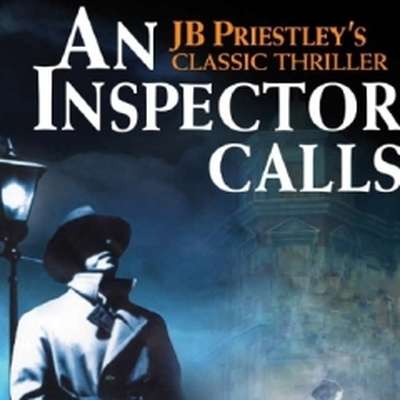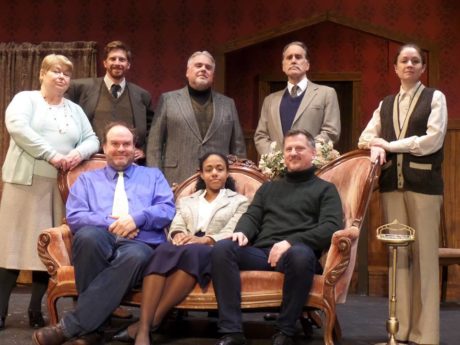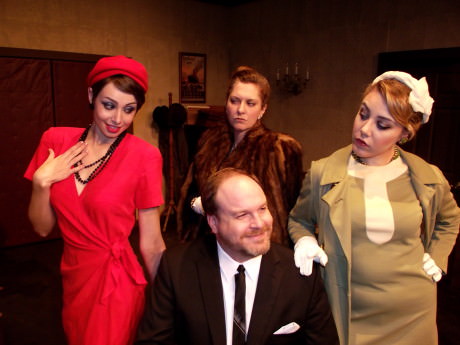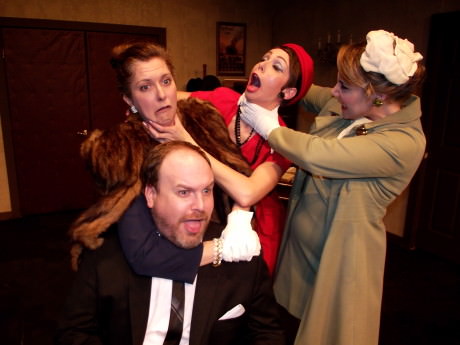An Inspector Calls, by J.B. Priestly, is currently playing at Laurel Mill Playhouse, produced by Maureen Rogers and directed by Ilene Chalmers. Priestly was from the working class, albeit white collar, in England. He became a respected writer and one of the leading proponents of socialism after World War II. Thus, it is not surprising that An Inspector Calls promotes Priestley’s values and also reflects his life experiences.
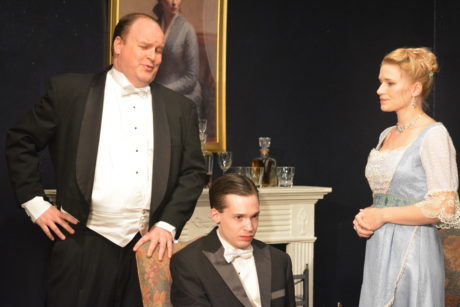
The play appears at first to be a drawing room mystery, very typical of British stage in the 40’s and 50’s. An upper-class family, the Birlings, is gathered for the celebration of the engagement of the daughter, Sheila (JilliAnne McCarty), to Gerald Croft (Matt Leyendecker), a businessman who is slightly higher on the social ladder. The Birling son, Eric (Kyle Kelley) is already inebriated and still imbibing. Into this comes Inspector Goole (Tom Piccin) who tells them about the death of a young woman in town. Each member of the group has had some involvement in the girl’s life. Each one may be responsible for her death. However, this is not a murder mystery or whodunnit. Instead, it looks at what responsibility the upper or ruling class has to those less fortunate. It deals with fair wages, unionizing, the impartiality of charitable organizations, abuse of power, misogyny, and inherited wealth and social position. Many of these themes resonate today, and the focus on this upper-class family whose wealth comes from new money will certainly bring to mind rich and powerful families in today’s world.
Jeff Dunne expertly plays the patriarch, Arthur Birling and Sam David plays his wife, Sybil. Dunne’s Birling is both intimidating and harsh to his children and, by his own words, to those he deals with in his business and community. David successfully creates the snooty and dispassionate wife and mother who clearly looks down on those less fortunate. Along with Leyendecker as Croft, the three cleverly evolve into the villains of the drama. Leyendecker has an especially difficult job of creating a character about whom we are initially impartial, then feel might be redeemable, and finally regard as one who is unkind and cunning. The actor does a remarkable job in creating this character without appearing too caring or too shallow, a perfect blend.
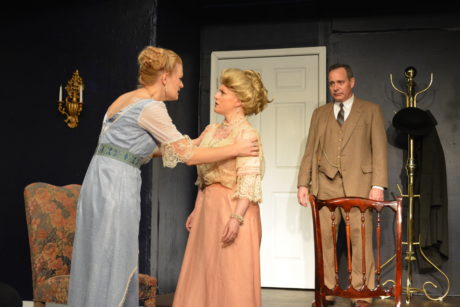
McCarty and Kelley give standout performances as the two adult Birling children. McCarty’s character is symbolic of the younger generation, questioning the attitudes and behaviors or their parents. McCarty brings energy and strength to her character as she stands up to her father and mother in Act III. Kelley is at once a lowly alcoholic disappointment for his family, but also one who shows more backbone than his parents and Croft in taking responsibility for his actions.
Piccin has created a dough-faced detective whose questioning is right out of Columbo, but whose facial expressions are more like Raymond Teller of Penn and Teller. We never are sure of his true feelings. Piccin keeps us guessing about Goole throughout the show.
Tracy Dye more than ably plays Edna the maid, and the character keeps us mindful of the differences in the social class.
Ilene Chalmers does a superb job as director. The play moves quickly, and our interest remains focused on the story of the life of the young dead woman, Eva Smith, who we never see on stage but who appears vividly in our minds.
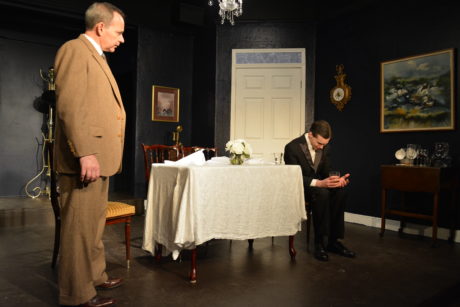
Chalmers also created the set which reflects accurately this upper class British family’s home and gives us plenty of interesting levels and allows the cast to freely walk about the stage. Chalmers and her husband David also create interesting visual effects through their light design.
The costumer, Linda Swann, has dressed these actors in attractive period clothing. Even the make-up and hair design (Ms. Chalmers and cast), help add to the interesting visual appeal of this drama.
Lori Bruun, as stage manager, guides the cast skillfully through this production.
In the end, the play leaves you with some answers and more questions about the characters, the fate of Eva Smith, and about economic and social inequality.
An Inspector Calls is an important play to see, despite being over 70-years-old. If you want a evening that will intrigue you and offer you insights into our social structure, then pay a call to Laurel Mill Playhouse before this play disappears again into the mist.
Running Time: Two hours and 35 minutes, with two 10-minute intermissions.
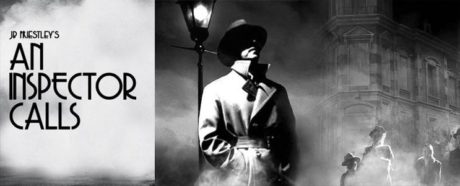
An Inspector Calls plays through Sunday, October 1, 2017 at Laurel Mill Playhouse— 508 Main Street, in Laurel, MD. For tickets, call the box office at (301) 617-9906, or purchase them online.
